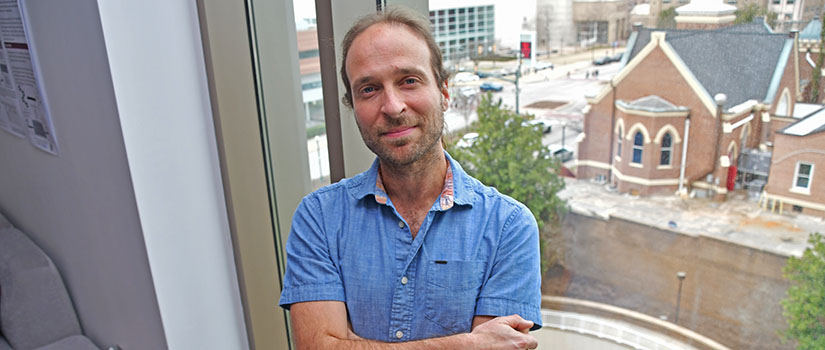Christian O’Reilly, a faculty member at the University of South Carolina’s Artificial Intelligence Institute (AIISC) and an assistant professor in the Department of Computer Science and Engineering, had extensive international experiences prior to arriving in Columbia in 2021. He worked in Switzerland on the internationally renowned Blue Brain Project and was postdoctoral fellow in Canada at the University of Montreal and McGill University. He has also completed research in identifying brain differences between neurotypical people and individuals diagnosed with autism spectrum disorder (ASD).
How did you initially develop an interest in artificial intelligence (AI)?
I have always been interested in AI and neural networks, but as I matured through my studies, I knew I wanted to focus more on biomedical applications because I wanted to have a direct impact on people’s lives. When I finished my Ph.D., I wanted to shift my field toward neuroscience, so I went for a postdoctoral fellowship on electroencephalography (EEG) and neuroimaging during sleep.
What has impressed you most about the AIISC compared to other places you’ve been?
What I’ve been the most impressed with, and I could even broaden it to USC in general, is that it has been a very welcoming experience. I’m collaborating with many faculty in different departments, and I didn’t have to struggle to get these connections. There are almost more opportunities for collaborating with faculty than I can handle. And it’s not like that everywhere, so it’s something I really appreciate.
What is your involvement with the Excellence Initiative at USC?
AIISC and the Carolina Autism and Neurodevelopment (CAN) Research Center were created as part of the Excellence Initiative at USC. The university decided to put a significant amount of money towards both by recruiting multiple faculty and researchers interested in similar topics. I was hired as a joint effort between the two. The advantage of having these centers is that it forms a network of people and allows us to develop access to research and support faculty in getting competitive grants.
Can you talk more about your work mapping the brains of those with ASD and the importance of that project?
After my Ph.D., I started a project on functional connectivity in people with ASD, which looks at how different brain regions talk to one another. For people with ASD, the world is not adapted to their needs, which can reduce their quality of life. Knowing what in the brain creates these differences helps us to diagnose ASD early and provide therapy that builds self-esteem and teaches life skills and healthy coping mechanisms. I have a nephew with ASD so I want my research to foster understanding and acceptance since I care about the social benefit of my work.
Christian is one of the most brilliant scientists with whom I have worked. I also appreciate his passion and enthusiasm for advancing scientific discovery.
- Mayada Elsabbagh, Ph.D., Associate Professor in Neurology and Neurosurgery, McGill University
Talk about your research experiences in Switzerland.
At the end of my previous post-doctoral project, I was not satisfied with my understanding of the thalamus and its role in sleep, which is, among other things, the gateway of all sensation. The Blue Brain Project had an open position modeling the thalamocortical loop but at the cellular scale. The goal was to do a more refined model of how the different neurons interact, and I worked on that for three years. I encourage students, if they can, to study in a different country because it opens the mind.
Does the combination of skills you acquired by studying multiple engineering disciplines give you a unique research perspective?
Yes, and I did it partly by design. I wanted to have the ability to transfer knowledge between different fields. What I try to develop across all these projects is a more model-driven approach. If you’re studying something complex like the brain you may have a lot of data but it is never sufficient to understand the complexity of the brain. The best way to deal with that is to first compile your knowledge as a model, and use that model to inform your analysis of the data.
What is one thing people would be surprised to know about you?
People are a bit surprised when I tell them that I’m a certified yoga teacher. I started to do yoga when I was in Switzerland, I was quite intensively taking yoga classes during that time. I saw an advertisement for a one-month teacher’s training course in India, and I liked it so much that I later ended up taking a one-year sabbatical to stay at an ashram [monastery] doing what they call karma yoga, which is basically volunteer work.
